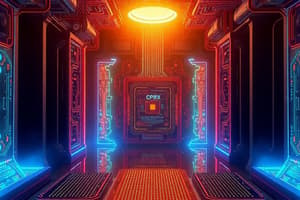Podcast
Questions and Answers
What is a key consideration when selecting the screen size of a computer for visually-heavy tasks like graphics or photo editing?
What is a key consideration when selecting the screen size of a computer for visually-heavy tasks like graphics or photo editing?
- Opt for a smaller screen size
- Choose one of the biggest size screens available (correct)
- Select a screen size between 14 to 16 inches
- Avoid large screens for better performance
Which processor is typically recommended for laptops used for web surfing, email, virtual school, or work?
Which processor is typically recommended for laptops used for web surfing, email, virtual school, or work?
- Intel i3 (correct)
- AMD Ryzen 7
- Intel Celeron
- Intel i7
What is the minimum recommended RAM for a computer used for graphics and gaming?
What is the minimum recommended RAM for a computer used for graphics and gaming?
- 2GB
- 8GB (correct)
- 16GB
- 4GB
Which type of hard drive capacity is suggested for computers used for web surfing and email purposes?
Which type of hard drive capacity is suggested for computers used for web surfing and email purposes?
What is the recommended screen size for an adult using a computer for web surfing, school, or work?
What is the recommended screen size for an adult using a computer for web surfing, school, or work?
Which computer configuration is typically recommended for laptop computers based on the provided text?
Which computer configuration is typically recommended for laptop computers based on the provided text?
What hardware component is crucial for easily opening many browser tabs and running multiple programs simultaneously?
What hardware component is crucial for easily opening many browser tabs and running multiple programs simultaneously?
Which hardware specification is particularly important for gamers?
Which hardware specification is particularly important for gamers?
What is the purpose of a Graphics Processing Unit (GPU) in a computer system?
What is the purpose of a Graphics Processing Unit (GPU) in a computer system?
Which computer user would typically need a laptop with at least 16 GB of RAM?
Which computer user would typically need a laptop with at least 16 GB of RAM?
When selecting a laptop for portability, which specification should be considered?
When selecting a laptop for portability, which specification should be considered?
Which computer user would benefit the most from a laptop with longer battery life?
Which computer user would benefit the most from a laptop with longer battery life?
What component in a computer can be compared to the brain?
What component in a computer can be compared to the brain?
Which manufacturer produces processors with names like i3, i5, and i9?
Which manufacturer produces processors with names like i3, i5, and i9?
What does a higher GHz speed indicate about a processor?
What does a higher GHz speed indicate about a processor?
What type of drive is known for being more stable and using less CPU?
What type of drive is known for being more stable and using less CPU?
Integrated graphics cards are typically found in computers used for what purpose?
Integrated graphics cards are typically found in computers used for what purpose?
Which component is responsible for managing visual output on a computer?
Which component is responsible for managing visual output on a computer?
Flashcards are hidden until you start studying
Study Notes
Defining Computer Specs
- Computer specs are classified into four categories: web surfing and email, online classes or work, graphic design or gaming, and general use.
CPU (Central Processing Unit)
- The CPU contributes to the speed and performance of a computer, like the brain of the computer.
- Intel and AMD are the two main manufacturers of processors.
- Intel processors include i3, i5, i7, i9, and x-series.
- A higher GHz speed means a faster computer.
Solid State Drive (SSD)
- A solid-state drive helps take care of data, replaces a hard drive, and uses less CPU.
- SSDs are more stable long-term and smaller in size and capacity.
Graphics Processing Unit (GPU)
- Most computers come with a GPU, also known as an integrated graphics card.
- A GPU is important for photo editing, graphic design, and gaming.
Peripherals
- Keyboards and mice usually come bundled with computers, and wireless devices are available for neater desktops.
Screen Size
- For web surfing, school, or work, a minimum screen size of 15” is recommended for adults, while smaller sizes are suitable for children.
- For visually-heavy activities, larger screens are recommended.
Computer Specs Examples
- For web surfing and email: Intel Celeron or i3, 2GB+ memory, 128GB+ hard drive, and a chosen screen size.
- For virtual school or work: Intel i5, 4GB-8GB memory, 256GB+ hard drive, and a 14”+ screen size.
- For graphics and gaming: Intel i7, 8GB-32GB memory, 500GB+ hard drive, and a 17”+ screen size.
Laptop Computers - Recommended Configurations
- Processor: Intel Core i5 (sixth generation or newer) or equivalent.
- Operating System: Microsoft Windows 10 Professional x64.
- Memory: 16 GB RAM.
- Storage: 500 GB internal storage drive.
- Monitor/Display: 14" LCD monitor, resolution of 1600 x 900 or better.
Battery Life
- Battery life is important for students or those who work remotely and may not have access to a power source.
- Battery life varies depending on laptop specs.
RAM (Random Access Memory)
- RAM enables users to easily open multiple browser tabs and programs simultaneously.
- Casual users need at least 4 GB RAM, gamers need at least 8 GB, and graphic developers/image editors need at least 16 GB.
Weight
- Weight is a consideration for those who plan to carry their laptop around frequently.
Studying That Suits You
Use AI to generate personalized quizzes and flashcards to suit your learning preferences.




